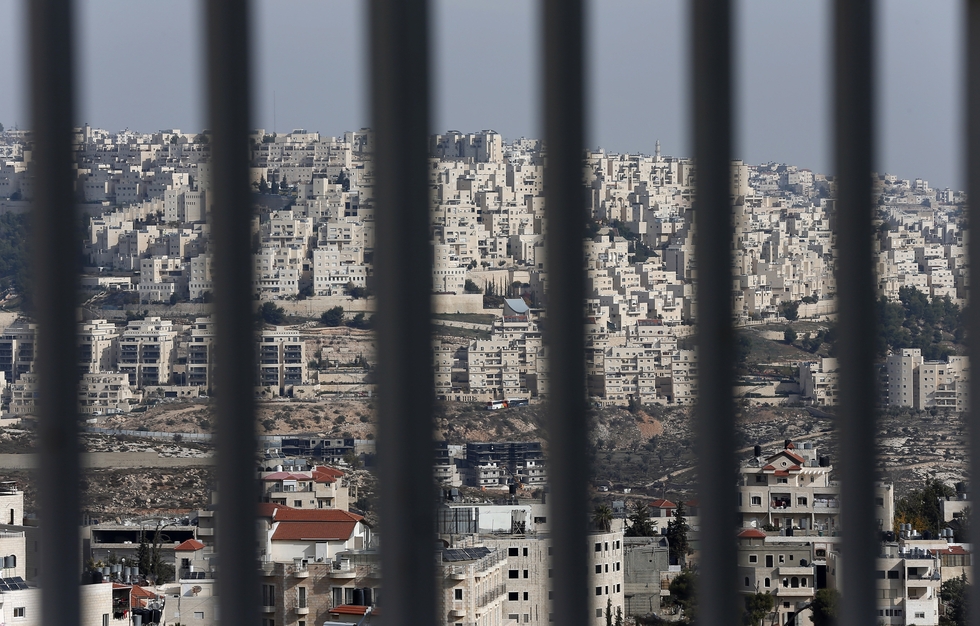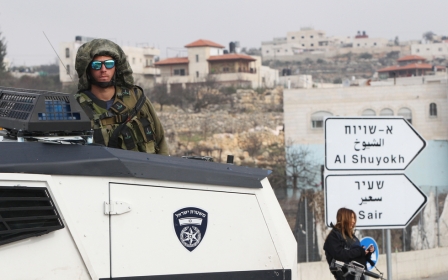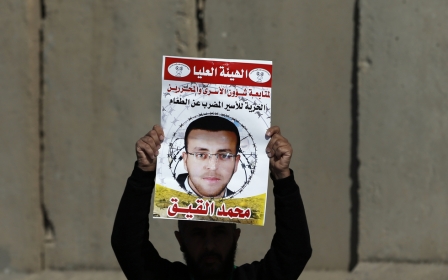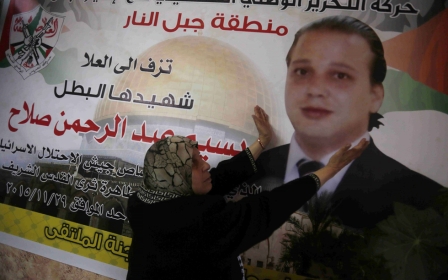Palestinian workers banned from settlement jobs

BETHLEHEM – For over a week more than 10,000 Palestinians have been barred from working in Israeli settlements in the occupied West Bank, after an Israeli army ban some have labelled as "collective punishment".
The Israeli army announced the ban earlier this month after the stabbing of two Israeli settlers, including a mother of six who was fatally stabbed in her home in the illegal settlement of Otniel, south of Hebron.
“In light of the daily situation assessment following recent terror attacks, security measures have been taken,” Brigadier General Lior Carmeli, a spokesperson for the Israeli military, said last week.
“As of today, Palestinian workers cannot enter Israeli communities in Judea and Samaria," he said, referring to the occupied West Bank.
The duration of the ban remains unclear, but the move is open-ended and will apparently be reviewed on a daily basis.
According to local news source Ma’an, the move is expected to impact approximately 11,000 Palestinian labourers whose occupations rely on access to settlements.
However, some estimates have put the figure much higher at 26,000 workers, the majority of who are employed in the construction, manufacturing and agricultural industries.
Devastating impact
In the West Bank, Palestinians have long struggled to stay afloat in an economy devastated by Israel’s military occupation, said Sam Bahour, a Palestinian-American businessmen and entrepreneur and a policy adviser at the Palestinian policy network Al-Shabaka.
“For the first 30 to 35 years of the military occupation, Israel structurally created a forced dependency of Palestine on the Israeli economy, and has done nothing to try to release this,” Bahour told Middle East Eye.
With the Oslo Accords in 1993, Palestinians lost the ability to develop 62 percent of Palestinian land, labelled Area C, and now the settlements have taken even more, he said.
“The settlements limit our ability to use the land they are built on – as well as large plots of land that surround the settlements,” Bahour said.
An estimated 500,000 settlers live in more than 100 illegal settlements built in the occupied Palestinian territory, where 31 percent of Palestinians are thought to be unemployed.
Settlers don’t actually compete with Palestinians for the same jobs, but the settlements, alongside Israeli policies, create conditions that put greater pressure on Palestinian workers and make it difficult for Palestinians to develop their economy, Bahour explained.
“Alongside the physical presence of these settlements and land confiscation, is the raping of the West Bank from its natural resources – from water, to access and the ability for Palestinians to move from one place to the other.”
“Travel from the north to the south, for example, is dictated by a single road which connects two parts of the West Bank. Our very road system is dictated by being worked around the settlement enterprise,” he said.
The Israeli government also grants mining rights to Israeli companies who operate in the West Bank, a contravention of international law, and control the telecommunication services allowing “frequencies to Israeli settlements, but not to Palestinians,” Bahour said.
Palestinian workers
With limited job prospects in the West Bank, many Palestinian workers are forced to seek employment inside Israel or settlements in the West Bank – long-deemed illegal according to international law.
“I always feel threatened, uncomfortable and not safe. It is not easy to work in an environment where you are scared while doing your job," Suhaib*, who lives in Bethlehem, but has been working in construction in Gush Etzion settlement for several years, told MEE.
“Of course, if there were employment opportunities for me here [Bethlehem], I would have chosen to work here. But the problem is, when I complete four years of college and graduate, I find no job.”
“This is a disaster," Suhaib sighed as he shook his head. “Especially when I should be helping my father in terms of household expenses. My work at the settlement is not a matter of choice. Current conditions force me to work in such place.”
When asked about the current ban, Suhaib shrugged and said, “To be honest it’s a normal feeling; it doesn’t matter whether we are banned here nor there… there are so many people who are not permitted to work in settlements, because Israel decides to issue working permits depending on their mood.”
“Sometimes Israeli contractors themselves force us to pay for the permit in order for us to work," he added. “It is just a humiliating life without dignity, nor opportunities.”
There are several types of permits available, depending on the source of employment and location of work, but Suhaib explained that the average permit costs $3,000 per year, has to be renewed upon annual expiration, and comes in the form of a paper document to be shown upon entry to the settlements.
Seeing as construction is by far the most common source of employment, Palestinian workers such as Suhaib are finding themselves literally aiding the physical expansion of settlements in the occupied land in the West Bank.
“It’s a Catch 22,” Bahour said. “Our workers need to put bread on the table, but by working in the settlements are supporting one of Israel’s modalities which are depriving Palestine of an independent economy.”
Exploitation
For workers, the choice can often feel like one between forgoing a job prospect or working to further the occupation of their land. For those like Suhaib who take the latter "option", exploitation is rife, with Palestinian workers often unable to form trade unions or exercise workers rights, whilst child labour is also prevalent.
“Whether Palestinian workers are allowed to work in Israeli settlements or not, the very existence and expansion of these settlements is depriving Palestinian workers from making a livelihood in decent conditions,” Carine Abu Hmeid, external relations coordinator at the Democracy and Workers’ Rights Centre in Palestine, told MEE.
Abu Hmeid said he thought that the ban would be temporary, but that whether Palestinian workers would or wouldn’t be allowed access wasn’t cutting to the heart of the issue.
“Abuses of the labour rights of Palestinian workers are the norm in Israeli settlements, and the vast majority of workers would quit immediately if they had access to alternative employment," she explained.
“Working in Israeli settlements is not a choice; it is the result of a lack of choices and opportunities in an economy strangled by Israel’s colonial occupation.”
Also on Tuesday, a new report was published by Human Rights Watch, which claimed businesses operating in settlements operate as part of "an inherently unlawful and abusive system that violates the rights of Palestinians", and “benefit from Israel’s unlawful confiscation of Palestinian land and other resources”.
The report claims that Israel’s discriminatory restrictions on Palestinians have harmed the Palestinian economy and “left many Palestinians dependent on jobs in settlements - a dependency that settlement proponents then cite to justify settlement businesses.”
Co-dependency
When asked whether the move to ban Palestinian workers access to the settlements would be permanent, Bahour agreed with Abu Hmeid that it would be a temporary measure.
“The value added of Palestinian labour allows settlements and certain sectors inside Israel – specifically agriculture and construction – to thrive; they are reliant on a cheap labour force.”
“Therefore the conditions of our labour force not being able to develop independently in the context of the occupation also serves Israel’s own economy”, Bahour explained.
“If we were able to develop our economy freely, we need these workers from the settlements and in Israel too. We need to absorb our own labour force, but we can’t do that while Israel maintains a monopoly over the resources.”
“It is a political calculation in order to serve their own needs; Israel is mitigating the ability of our society not to collapse, but they are not letting us thrive either.”
The ban, which severs West Bank ID holders from some of the few employment opportunities still available to them, is not without precedent.
In November Palestinian labourers were temporarily barred from working in the Gush Etzion settlement bloc following the fatal stabbing of an Israeli settler.
In July, after the Duma arson which killed three members of the Dawabsha family, the army periodically prohibited workers from entering specific Israeli-occupied areas to avoid “revenge” attacks.
Collective punishment
Israeli daily Haaretz published comments from the Israeli army, claiming the decision to ban Palestinian workers from having access was “necessary to maintain order inside settlements”.
However, similar incidences in the past have been condemned by the UN and rights-based organisations as “collective punishment”.
The ban is one of several measures imposed by the Israeli army upon entire Palestinian communities since violence escalated in October, which also includes road closures, the restriction of access to and between villages and neighbourhoods and the indiscriminate use of tear-gas.
The Tel Rumaeida neighbourhood in Hebron, for example, was declared a closed military zone in November, a restriction that is being reviewed on a daily basis.
*Names have been changed to protect the anonymity of sources
New MEE newsletter: Jerusalem Dispatch
Sign up to get the latest insights and analysis on Israel-Palestine, alongside Turkey Unpacked and other MEE newsletters
Middle East Eye delivers independent and unrivalled coverage and analysis of the Middle East, North Africa and beyond. To learn more about republishing this content and the associated fees, please fill out this form. More about MEE can be found here.




